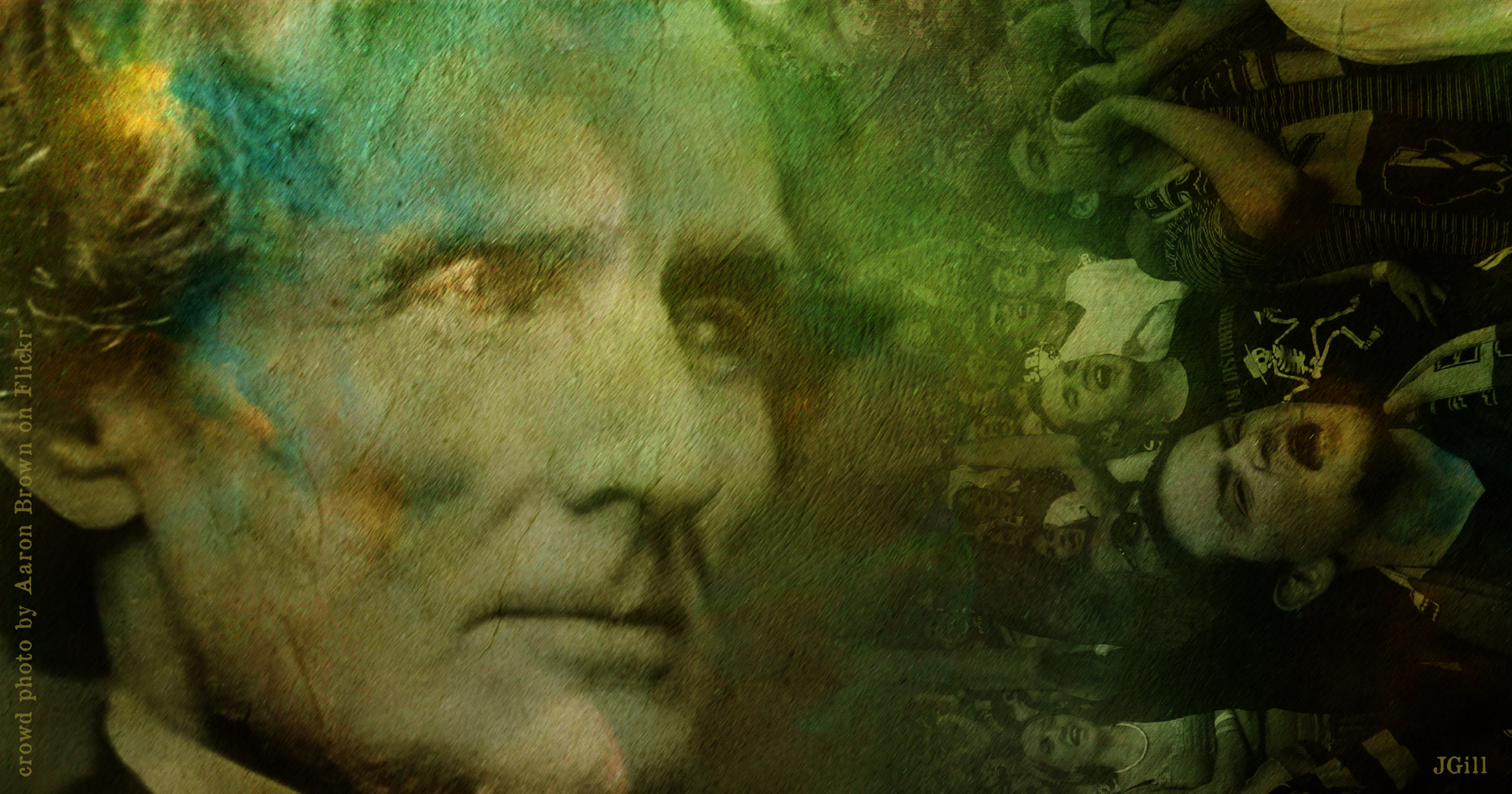“No one has ever doubted that truth and politics are on rather bad terms with each other.”
—Hannah Arendt
(in her 1967 essay, “Truth and Politics.”)


A few days ago, the Barna Group released the results of its latest poll, asking “Americans whether capitalism or socialism align better with the teachings of Jesus,” explains The Hollywood Reporter. The results are that “socialism won 24 percent compared to 14 percent, with the rest answering ‘neither’ or ‘not sure.’”
And what about the year’s big race?
“When asked which presidential candidate’s policies aligned closest to the teachings of Jesus, Sanders was on top with 21 percent, compared to 9 percent for Hillary Clinton and 6 percent for Donald Trump.” Ted Cruz, no longer in the race, fared better than Hillary, but below Bernie, at 11 percent.
Now, it is worth mentioning that more significant polling on issues relating religion to politics has been done by Barna. Still, the commentary over at Fox on this poll was … interesting.
On Bill O’Reilly’s show, Monica Crowley made the crucial distinction between Jesus’ command to give to the poor and modern socialists’ demands to take from some, through taxation and by force, to give to others.
O’Reilly himself, however, went on a bizarre and joking riff about “buying his way to heaven” by leaving his wealth to charity … after he dies.
Looking over these poll numbers, I can only conclude that advocates of a free society have much work to do convincing Americans of the justice and benevolence of free markets, of “capitalism.”
And Christians have their work cut out for them, too … at the very least to disencumber themselves from the stench of socialist states and the brutal force those states inevitably rest upon.
This is Common Sense. I’m Paul Jacob.

When people risk their lives, saying thanks is the least we can do.
But it’s not enough.
Today on Veterans’ Day, we honor those who have served and are serving in the military.
The holiday was once Armistice Day, marking the peace agreement that concluded World War I at the eleventh hour on the eleventh day of the eleventh month of 1918. That’s where the phrase “the eleventh hour” comes from. It’s also why the holiday has remained on whatever day Nov. 11 falls — not the closest Monday to provide non-military government workers another three-day weekend.
Of course, Woodrow Wilson’s “war to end all wars” didn’t end warfare. Numerous wars have followed. Today, the president goes to war whenever he feels like it, not only without a declaration, without any authorization — or even discussion — by Congress.
So, here’s what I think we owe veterans:
A federal government that keeps its word.
The Veterans Administration’s continued failure to adequately care for returning soldiers is unacceptable. Until the VA is fixed, don’t vote for any incumbent.
Don’t let our uniformed sons and daughters be shipped off to any conflict where (a) our freedoms are not directly threatened, and (b) where there’s no sane plan to end the conflict and bring our troops home.
Don’t trust politicians.
From the sinking of the Maine (Spanish-American War) and the Lusitania (WWI) to the Gulf of Tonkin incident (Vietnam) and the faulty intelligence that greased the path into the Iraq Conquest, distrust is rational, almost a duty.
Disagree over foreign policy? Over whether to go to war or not? Sure, but we cannot leave these decisions to an insulated cabal of politicians. Deinsulate them. Speak your mind.
This is Common Sense. I’m Paul Jacob.


As America stands upon a precipice of insolvency, as southern European nations undergo the spasms of sovereign debt catastrophe, as many of our citizens call the Chinese devaluations of their money “currency wars,” obsessing about political symbolism seems … a tad … trivial.
First it was the Confederate Flag. Now it’s Jefferson Davis.
He’s dead. And as a result of his 126 years in the “post-living” state, he quite literally doesn’t matter for the future of the United States.
And yet the Confederacy’s president (1861 – 1865) is in the news again. As Charles Paul Freund relates at Reason, the dead rebel prez has been having a figurative “bad summer.” How? The University of Texas has decided to move his statue into a museum, away from public eyes; some Georgians want to obliterate the Stone Mountain tableau that features Davis along with Stonewall Jackson and Robert E. Lee; there’s talk of renaming Virginia’s “Jefferson Davis Highway”; etc.
Davis died unrepentant, refusing to ask Congress for a pardon for his part in the Confederacy after the secessions of 1860 and ’61. And yet he was pardoned in 1978, posthumously, by the Democratic Congress and President Jimmy Carter, who yammered on in a Fordian “long national nightmare is over” fashion, saying the pardon would, at long last, “clear away the guilts and enmities and recriminations of the past.”
I’m not convinced it did a thing.
And about the current proposals? I don’t think any highway should be named after any politician. Of the other ideas, I don’t really care. Much.
Nevertheless, fights over political symbols have long been important. Why? My guess: to deflect our attention — away from the future, and to the past.
This is Common Sense. I’m Paul Jacob.

Shouldn’t we imprison anyone who dares criticize the conduct of abusive public officials?
Panic not. You haven’t slipped through a portal into another dimension.
This is still Common Sense. I’m still Paul Jacob.
Interpret the initial interrogative, above, as my sardonic paraphrase of somebody else’s sentiment — that of a power-abusing official who bemoans any chastisement of his lousy actions. Who even threatens to prosecute persons voicing such criticism.
The man is John Chisholm, a Milwaukee D.A. who intimates that Wisconsin Governor Scott Walker should be investigated for blasting Chisholm’s churlish tactics against political opponents. These tactics include late-night raids motivated solely by political animus. (I’ve reported on these doings.)
Scott Walker told Iowans that “if the government can do that against people of one political persuasion, they can do it against anybody.… [I]t was really about people trying to intimidate people … [A] political witch hunt.”
Responding, Chisholm suggested, with blunderbuss subtlety, that “the Iowa criminal code, like Wisconsin’s, has provisions for intentionally making false statements intended to harm the reputation of others.”
Chisholm, you bum. You knave. You vile excrescence. Not even you dispute that your office’s raids directed against people like my colleague Eric O’Keefe occurred. Thus, you’ve no hint of a basis for a slander claim. You did the dirty deeds we’re deriding. Cheer and hug you for it, should we? (Eric has sued to block Chisholm’s secretive “John Doe” raids.)
All this does sound like the Twilight Zone. Unfortunately, it’s part of a new normal. Not one we need accept, however.
This is Common Sense. I’m Paul Jacob.

Yesterday I argued that the Ten Commandments can and should be promoted — privately. Promoting one’s religion is expected … outside of government. But do that as a government official and suddenly what most folks consider good common sense morality sows discord.
Why? Simple. Your religion is yours. But the government is ours. It’s supposed to be. But since we don’t all share the same religion, your monument on public property or public commemoration seems nothing more than you shoving yours at us.
With the Decalogue, it’s even trickier. The Ten Commandments aren’t numbered as such in either Exodus or Deuteronomy. Jews, Catholics, and various Protestant denominations differ on ordering them. What one group calls the Fifth Commandment another calls the Fourth. What most American Protestants call the Tenth Commandment is numbered as the Ninth and Tenth by Catholics. And so on.
So any enumerated Decalogue is not merely Judeo-Christian-centric, likely to make Buddhists, Hindus, Yazidis and Sikhs at the very least uncomfortable. It would necessarily be denominationally preferential.
I bet most Ten Commandment listings promoted by American politicians are not the ones Catholics have memorized, by order — or Jews, or even Lutherans and Episcopalians.
These differences usually appear quite small, of course, especially in light of the overwhelming similarities. Accordingly, any disagreements about the Ten Commandments remain friendly, and will likely stay that way — unless government chooses one version over another.
In politics, the doctrine of enumerated powers is divisive enough. Add in multiple, competing enumerations of the Ten Commandments? Too much to divide us.
This is Common Sense. I’m Paul Jacob.